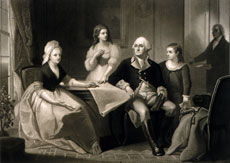 |

Return to Civilian Life
|
 |


RETURN TO CIVILIAN LIFE
 |
 |

Portrait of the Washington Family by William Sartain, mezzotint, 1864
National Portrait Gallery,
Smithsonian Institution
|
 |
Washington gives up command of the Continental Army and returns to private life, astonishing King George III, who had expected Washington to become a military dictator.
Revolutionary soldiers, reacting to rumors that the army would be dismissed without being paid, fix bayonets and surround Philadelphia’s Independence Hall, where the Continental Congress is meeting. Washington sends troops and Congress prudently moves to Princeton.
Washington meets with mutinous officers, successfully urges them not to “sully the glory” they had earned. But a colonel writes to him, suggesting that he crown himself king, supported by “the universal esteem and veneration of an army.” A shocked Washington replies that “no occurrence in the course of the War has given me more painful sensations” than that letter.
|
 |
Mobs of farmers, under Daniel Shays, rebel against Massachusetts state authority. Shays’ Rebellion peters out, but Washington is concerned. “There are combustibles in every State which a spark might set fire to,” he writes.
|
 |
Delegates from 12 states arrive in Philadelphia to rewrite the Articles of Confederation. Washington is a delegate from Virginia. The delegates bicker through the summer. “I almost despair,” Washington writes, but they hammer out a Constitution. It must be ratified by at least nine of the 13 states.
Washington, putting his reputation behind what he called “An indissoluble Union of the States under one Federal Head,” overwhelms the opposition. A newspaper says his words are like a statement “dictated by God.”
|
|




